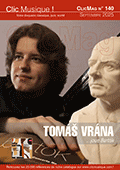 Après Hassler, van Noordt et Krebs, Manuel Tomadin réalise cette première édition complète de la musique pour orgue de Martini. Surnommé à sa mort le "dieu de la musique de son temps", Martini était sûrement le plus érudit des musiciens italiens du XVIIIe siècle. Cet enregistrement, qui a été produit sur une variété d'orgues italiens historiques de son époque, rend compte du génie de Martini. Sa production pour orgue ici écoutée est dominée par un ensemble de douze sonates, certaines composées comme des suites de danse françaises, d'autres comme des sonates italiennes en trio, facilement transférables entre clavecin et orgue. Ensuite, il y a de nombreuses pièces individuelles plus courtes à usage liturgique. Nous retrouvons sa volonté d'expérimenter (via des tonalités inhabituelles) et de pousser ses compositions au-delà des schémas traditionnels, ce qui est une caractéristique qui révèle sa volonté d'améliorer sa propre méthode de composition et d'aller au-delà du style conventionnel. Ainsi, et parce qu’il s'intéressait également à la musique contemporaine, le style devenu moins savant et plus élégant de Martini conduit au début du romantisme et de l'opéra italien. (Mathieu Niezgoda)  A first-ever complete recording for the organ output by a pivotal figure in 18th-century music across Europe. ‘Upon so short an acquaintance I never liked any man more,’ wrote the English traveller Charles Burney, ‘and I felt as little reserve with him after a few hours conversation, as with an old friend or beloved brother.’ The young Mozart was also privileged to enjoy his friendship: ‘I never cease to grieve that I am far away from that one person in the world whom I love, revere and esteem most of all.’ They are writing of (and to) Giovanni Battista Martini (1706-1784), who was referred to at his death as ‘Dio della musica de’ nostri tempi’ – the God of music of our time. Born and raised in Bologna, he took holy orders at an early age and rarely left his home city, apparently due to poor health. However, this cloistered lifestyle scarcely inhibited a mind of prodigious energy and industry. In 1758 he was made a member of Bologna’s most select academic society after presenting a paper (in Latin) on the use of geometry in music. Martini also wrote comprehensive manuals on counterpoint and music history, demonstrating an erudition which he passed on to many students who would become among the most noted composers of the day, among them J.C. Bach, Grétry, Jommelli, Mozart and Naumann. His own music speaks of a lively mind, thoroughly schooled in 18th-century conventions but presenting a considerable variety of styles, doubtless informed by his scholarship. His organ output is dominated by a set of 12 Sonatas Op.2, some composed as French dance suites, others as Italian trio sonatas, readily transferrable between harpsichord and organ. Then there are many individual shorter pieces for liturgical use, to mark the Elevation of the Host, the final Blessing and the end of Mass, which Martini would doubtless have first played himself at the Bologna church where he was director of music for almost 60 continuous years. Around the specifically liturgical pieces, Manuel Tomadin arranges Toccatas, Allegros and ‘Pieni per organo’ to make nine recitals which cover the full stylistic range of Martini’s output and may be enjoyed specifically liturgical pieces, Manuel Tomadin arranges Toccatas, Allegros and ‘Pieni per organo’ to make nine recitals which cover the full stylistic range of Martini’s output and may be enjoyed independently of the others. This box is the latest of Manuel Tomadin’s achievements for Brilliant Classics in reviving more or less unfamiliar figures from the Baroque era with first-ever complete editions of their keyboard music. Previous such editions have been dedicated to, among others, Hans Leo Hassler (95331), Anthoni van Noordt (95895) and Johann Ludwig Krebs (95363), and many of them have won enthusiastic reviews.
 |
